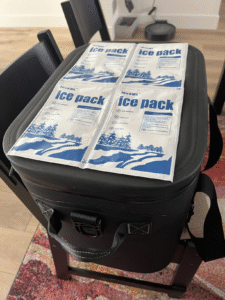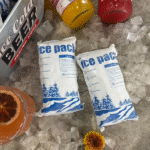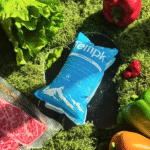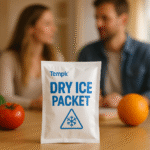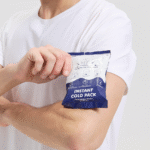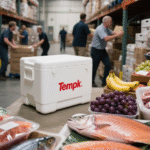How to Choose a Dry Ice Bag with Handle in 2025
If you ship frozen food or medicines, a dry ice bag with handle is the simplest way to keep payloads ultra-cold without leaks or mess. Dry ice sits at −78.5 °C and typically consumes about 5–10 lb every 24 hours, so sizing and venting matter for safety and hold time. This guide shows you how to choose, pack, and label the bag for 12–48-hour lanes while cutting spoilage and driver effort.
-
What makes a dry ice bag with handle safer and colder?
-
How do you size a dry ice bag with handle for 12–48-hour runs?
-
How do you pack and label a dry ice bag with handle correctly?
-
Which 2025 trends matter for your operation?
What makes a dry ice bag with handle safer and colder?
A dry ice bag with handle pairs thick insulation with safe venting, letting CO₂ escape while keeping frozen temperatures stable. Handles reduce contact time with cold surfaces, preventing injury and improving ergonomics for couriers. For compliant shipping, mark packages “UN 1845” and use the Class 9 hazard label, and avoid airtight seals so gas can vent.
Why it works for you: the bag slows sublimation, spreads cold evenly, and the handle supports quick, safe transfers during multi-stop routes. For most routes, the rule of thumb is 5–10 lb of dry ice per 24 hours depending on insulation and ambient heat.
How do insulation and vents extend hold time?
Insulation (foam + reflective film) reduces heat gain, while vent gaps or valves prevent pressure build-up from CO₂ gas. That combination preserves colder air around your goods and avoids ruptures. In practice, pellets spread cooling evenly; blocks last longer but cool less uniformly.
| Size–Use Fit | Typical Dry Ice Load | Expected Duration | What it means to you |
|---|---|---|---|
| Small route (5–10 lb bag) | 5–8 lb | 12–24 h | Ideal for courier routes and ice cream drops. |
| Standard day (10–20 lb bag) | 8–15 lb | 24–48 h | Covers most regional deliveries with buffers. |
| Bulk or multi-day (20 lb+) | 15–30 lb | 48 h+ | For long lanes or hot climates with delays. |
Practical tips that cut risk and waste
-
Pre-chill the dry ice bag with handle for 20–30 minutes before loading.
-
Separate product from the ice using pads or a shelf; avoid direct contact with vials or cartons.
-
Carry by the handle, not the shell, to avoid frostbite and speed hand-offs.
-
Never make it airtight; venting prevents rupture and keeps you compliant.
Real-world snapshot: A meal-kit operator switched to handled dry ice bags and cut melt-related returns by ~90% on 200 km routes, while improving driver ergonomics at the door.
How to choose the best dry ice bag with handle in 2025?
Match capacity, insulation grade, and handle design to your lane length and load. Start with your longest route and the target arrival state (hard-frozen vs. deep-chilled). Then pick a capacity that fits your product + dry ice mass with room for airflow. Look for reinforced or padded handles, durable zippers, and water-resistant shells.
3-step sizing mini-tool (use in the field):
-
Transit hours × 0.25–0.4 lb = dry ice per hour buffer.
-
Add 20% for hot weather or frequent door-opens.
-
Choose the smallest dry ice bag with handle that fits that ice mass plus your payload and dividers.
How to use a dry ice bag with handle safely and legally?
Protect skin, ventilate, and label—then train your team to do it every time. Wear insulated gloves and safety glasses when loading. Pack and open in well-ventilated areas. Keep zippers slightly open or use designed vents; do not seal air-tight. Label as UN 1845, Class 9 where required and keep the bag upright in transit.
Simple SOP:
-
Don gloves; pre-chill the dry ice bag with handle.
-
Load blocks at the bottom or pellets in pouches; add a pad between ice and goods.
-
Stow items; close with a visible vent path.
-
Apply hazard marking; place in a ventilated vehicle section.
-
At delivery, open briefly, remove items, and let residual ice sublimate in a safe area.
Will a dry ice bag with handle pay off for food and pharma?
Yes—fewer spoilage claims, faster hand-offs, and scalable re-use make the ROI clear. Food services eliminate melted desserts and soft proteins on hot days, while labs keep vials frozen across multi-stop routes. The handle speeds stairwells, elevators, and doorways, cutting dwell time at each stop and reducing driver fatigue.
2025 cold-chain trends for the dry ice bag with handle
The big shifts this year: lighter, greener insulation; sensor-ready bags; and modular inserts that extend duration. Many teams add Bluetooth loggers and use reusable handled bags to cut foam waste. Hybrid approaches combine pellets for fast pull-down with blocks for long hold, improving results on traffic-prone urban routes.
Frequently Asked Questions
Q1. How much dry ice goes in a dry ice bag with handle for a day trip?
Plan 5–10 lb per 24 hours depending on climate and insulation; add 20% if you expect delays.
Q2. Should the dry ice touch my product?
No—use pads or a divider so cartons or vials don’t contact the ice; cold shock can damage packaging.
Q3. Do I seal the bag completely?
No. Dry ice becomes CO₂ gas. Keep a vent path and never make the package airtight; apply UN 1845 and Class 9 where required.
Q4. Pellets or blocks for my route?
Use pellets for even, fast cooling and frequent opens; blocks for fewer opens and longer legs. Many teams mix both in one dry ice bag with handle.
Summary & recommendations for your dry ice bag with handle
Pick the right size, ventilate, and train. Choose a dry ice bag with handle sized to your longest lane; budget 5–10 lb per day, and keep a vent path with required hazard marks. Pre-chill, separate goods from ice, and carry by the handle for safer, faster hand-offs.
Next steps: run a lane test this week. Log temps, weigh ice before/after, and right-size your dry ice bag with handle fleet. Need help? Book a 15-minute assessment with our packaging team.
Internal link suggestions for the dry ice bag with handle (your site)
About Tempk
Tempk designs and validates temperature-controlled packaging used by food services, labs, and healthcare providers. Our reusable handled bags, ice packs, and coolers are R&D-tested for long hold times, and our team helps you match solutions to your routes and compliance needs. Get tailored recommendations for your next lane.






